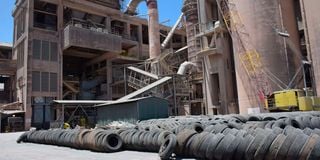
The Bamburi Cement Factory in Mombasa.
The battle for ownership and control of listed Bamburi Cement is bound to be a cause célèbre especially as the D-Day for expiry of the two takeover offers approaches.
Two companies are engaged in a do-or-die battle for ownership of the most profitable cement manufacturer in East Africa.
On one corner is the Kenyan company owned by the former CEO of the financially-troubled Savanah Cement, Mr Benson Ndeta, who has confounded pundits by staging an audacious Sh27 billion offer to purchase Bamburi through a company he owns and controls by the name Savannah Clinker Ltd.
On the other corner is Amson Industries (T) Ltd, a private company registered in Tanzania owned the family of a wealthy oil tycoons with an offer of Sh23 billion.
This week, corridors of stock brokerage houses and boardrooms of major institutional investors have been gripped by animated discussions following an appearance in the marketplace of a widely circulated dossier containing sensational claims and issues touching on the Bamburi Cement takeover transaction.
The air in the marketplace is rife with claims and counterclaims. From discussions with punters, it emerges that the most controversial question is whether or not the regulator, the Capital Markets Authority (CMA), conducted adequate due diligence on the integrity and bonafides of the entities involved in the transaction before approving the offer. Secondly, and perhaps most pertinent, whether the policeman of the marketplace had confirmed beyond reasonable doubt that the entities angling to buy the listed company have the money — whether the offerers, or their investment bankers, provided to the regulator of the marketplace evidence of proof of funds.
CMA takeover regulations
These are pertinent questions because, under CMA takeover regulations, an entity wishing to take over a listed company must himself or through its financial adviser show that it has the financial capability to accept and carry out the takeover offer in full.
This is what the regulations say: “A person shall not make a takeover offer or give notice or publicly announce that it intends to make such an offer if there is no reasonable or probable grounds for believing that it will be able to perform its obligations if the offer is accepted.”
On Monday, I called Mr Ndeta, to respond to the issues that have arisen in the raging controversy. His response was cryptic: “As an experienced journalist, you should be asking only one question; if we indeed don’t have money to conclude the transaction and if our funders are fraudulent and fake, why are they fighting us?”
“Why shouldn’t’ they just sit still and wait since they believe our offer will fail and they will automatically be the new owners of Bamburi Cement Company Ltd?”
It is not for me to comment on the veracity or not on the claims and counterclaims in the widely circulated dossier I have referred to at this stage. I can only comment on incontrovertible facts, which are as follows.
According to material contained in the offer documents, Clinker Ltd’s proof of funds has been provided by the local investment bank, Faida Investment, which as we all know, is regulated by the CMA.
This is what Faida says: “We confirm that sufficient resources are available to Savannah Clinker to satisfy the maximum amount payable under the offer. Secondly, Faida confirms it had received a letter from an American entity by the name Global Infrastructure Finance and Development Authority (GIFDA) Inc attesting its commitment to fund the acquisition of Bamburi Cement.”
KCB Investment Bank
The clincher in the Faida document is the following quote: “We give the foregoing information without any responsibility on the part of Faida Investment Bank.”
In the case of Amsons, the proof of funds has been presented by KCB Investment Bank in the following words: “Amsons has provided to KCB Investment Bank, through their principal banker, the Kenya Commercial Bank, an irrevocable bank guarantee confirming that the full amount of Sh23 billion will be available.”
At the core of the controversy remain matters around the involvement of the American entity, GIFDA, in this takeover transaction. At the end of the day, the whole controversy begs the following question: Who will protect the interests of the 4,000 small Bamburi Cement shareholders who were seeing the takeover transaction as presenting them an opportunity to unlock value from the stock?
When the CMA approves transactions before adequate due diligence and without settling issues regarding material information and disclosures with finality, it is the minority shareholder who suffer.
Is protection of the interests of the small retail shareholder really a major objective for the regulator? In Nakumatt, Chase Bank and Imperial Bank, we witnessed cases where bonds and commercial paper issues are approved by the CMA only for the issuing companies to collapse shortly thereafter, exposing small investors to misery and penury. We forget that the reason small investors put their hard earned savings in shares, bonds and commercial paper is because they believe that approval by CMA means something.













